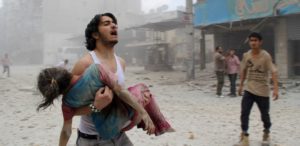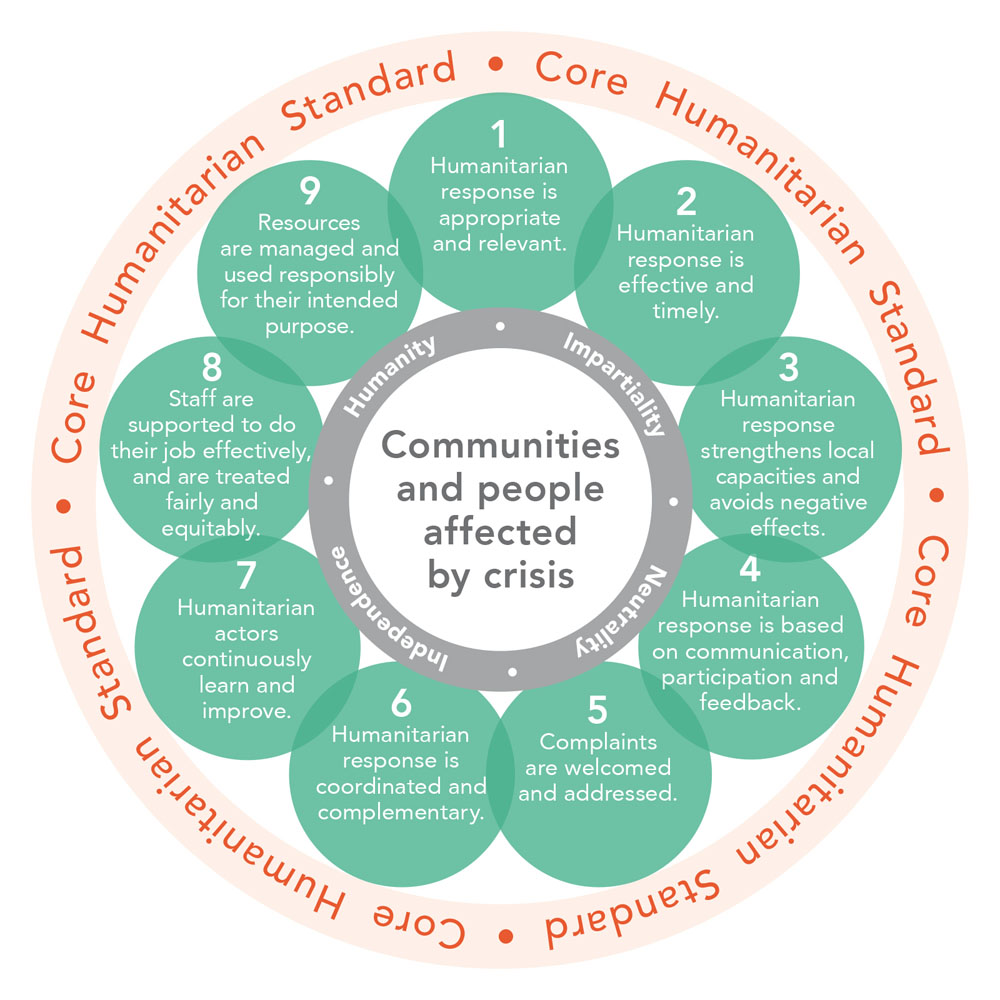Introduction
For this week’s blog post we were challenged to discuss the Humanitarian Imperative. What is the Humanitarian Imperative? That is a fantastic question! A quick Google search of the term yields many results including links to the Unicef, Red Cross, and United Nations websites. After conducting some research of my own, I have come to my own conclusions of what the Humanitarian Imperative means. To me, the Humanitarian Imperative exists. That said, the interplay between good intentions and true amelioration is more complex than one might think. Before I define the Humanitarian Imperative, there are a few topics that must first be addressed: empathy, universal human rights, and the all too common phenomenon of ineffective aid.
Empathy
It should be no surprise that humans are a social species. In fact, in their chapter on Mead, David Ashley and David Orenstein state, “Like Hegel, Mead believed that individuals must be fully social if they are to be fully human” (396). To me, this makes sense. While I understand that regardless of our social capabilities we are still considered homo sapiens, I would argue that the ability to interact with, understand, and absorb culture is a strictly human activity, and one that requires each individual to be social. Additionally, role taking is incredibly importance in the formation of one’s sense of self and society. In a sense, society only exists because humans interact with each ther. This is an interesting proposition, but one that I believe is true. I mean think about it, we could all spend time sitting alone in our rooms watching Netflix. While that would be entertaining for a while (and maybe forever), we don’t learn anything about ourselves or about each other. Excluding the cultural knowledge we would learn from the shows we watched, if all we did was watch TV from birth until death, we wouldn’t know how to act in social situations. We wouldn’t know who we are in relation to others and I would argue that we wouldn’t have a self. This brings me to one of Mead’s points, that the self is discovered through society and vise versa, but how? Mead claimed, that in order to discover ourselves we must engage in social relationships and in doing so we must interact with other people. That said, our interactions aren’t just a random series of actions, but instead are based off the actions and reactions of those we interact with. In a sense, we all must be prepared to evaluate and constantly reevaluate a situation in order to know how to react to another social being. While the process sounds exhausting, Mead proposes that it is simpler than we think and often occurs unconsciously. He states, “[individuals] must be able to project themselves mentally into a position in which they can imagine how others will react to their behavior” (Ashley & Orenstein 401). In other words, this projection of oneself onto another allows individuals to reflect on their behaviors through the eyes of others. This in turn allows individuals to evaluate and experience themselves as objects, which Mead claimed was necessary for continued societal existence.
While this process of role taking might seem cumbersome and maybe even a bit unnecessary, Mead argues that it plays a huge role in societal cohesion. In fact, once a child learns that they are no longer the center of the world, and that other humans matter, this process occurs quite naturally. While developing individuals begin this process by taking on different roles (what Mead would call “the play stage”), as they mature they begin to see themselves through the lens of their community, their nation, or even the world (what Mead would call “the game stage”). This shifting of roles and projections is what Mead refers to as the “Generalized Other,” and has a lot to do with what we call “empathy.”
So what is empathy? In simple terms, it is the ability to feel how others feel through the perception of body language, verbal communication, and facial expressions. It requires not only an understanding of others, but also of the self. Empathy involves introspection and projection, but what is the science behind it all? Let me explain! Over the past two decades, scientists have been studying cells they believe are linked with the process of empathy: Mirror Neurons. Mirror Neurons are a special type of brain cell located in Brodmann’s Area 9 (BA 9) or the right inferior gyrus of the brain. Mirror Neurons fire (become activated) when one completes a task, such as reaching for a dish on a high shelf. Interestingly enough, the same Mirror Neurons that fire when completing an action yourself fire when watching another person complete a task as well. This same process occurs in observing emotional action as it does with physical action, which explains why we might truly feel sad for those who cry, or experience second hand embarrassment for someone who spills their coffee on their Professor’s shirt. In other words, the same brain regions that activate when we experience a sensation, also activate through observation.
A while back, I became fascinated with the concept of Mirror Neurons and decided to do some research. I found a study published in the journal Brain Imaging and Behavior entitled “Mirror neuron activity during contagious yawning—an fMRI study.”As one might guess by the title, the study discussed the phenomenon of contagious yawning. I would guess that contagious yawning is something we have all experienced at least once, if not many times, in our lives. Why does that happen? Are yawns actually contagious? Researchers Helene Haker, Wolfram Kawohl, Uwe Herwig, and Rössler would say yes. In fact, yawning is a form of empathy. I know that seems like a far-fetched thought, but it isn’t. Let me explain. First, the researchers noted that contagious yawning has been observed in species other than humans. Additionally, contagious yawning is impaired in people with Autism Spectrum Disorder, PTSD, and Schizophrenia, all of which are characterized by a lack of or reduced empathetic behavior. To continue, in their study, the researchers proposed that the human mirror neuron system (MNS) is activated by watching people yawn. After completing a series of fMRI brain scans they found that “[in] response to yawning, subjects showed unilateral activation of their Brodmann’s area 9 (BA 9) portion of the right inferior gyrus, a region of the MNS. In this way, two individuals could share physiological and associated emotional states based on perceived motor patterns. This is one component of empathy (motor empathy) that underlies the development of cognitive empathy.” (Haker et al. 28). In simpler terms, they discovered that individuals do experience contagious yawning and that the region of the brain containing the Mirror Neurons is activated in this process. In sum, yawning is an empathetic behavior, but not in the emotional sense, but rather a form of action or “motor” empathy.

Universal Human Rights
If you’ve gotten this far in my blog post, please bear with me. My main goal in discussing empathy was to shed light on a quality that the vast majority of our species experience. Due to this fact, I have concluded that the Humanitarian Imperative is part of who we are as a species. The desire to help others who are suffering is in our DNA and it is truly a wonderful quality. That said, our natural empathetic urges can be corrupted by prejudice and hatred in the form of sexism, racism, classism, heteronormativity, and neoliberalism to name a few. In fact, it is these -isms that allow us to dehumanize specific groups, and suspend our empathetic tendencies. It is when we fail to be empathetic that true atrocities can be committed. A few examples come to mind including the Holocaust, slavery in the United States, the extermination of the Native Americans, the Mai Lai Massacre, and countless other events. This leads me to my next point: universal human rights.
Shortly after World War II, the United Nations General Assembly drafted what is known as The Universal Declaration of Human Rights. This document, truly the first of its kind, was a direct response to the cruelty humans impose on other humans. It was a document meant to serve as a mutual agreement of what it means to be human and to create a more peaceful world. Two quotes are especially poignant. The first comes from Article 1 of the document, while the second comes from Article 2. The former states,“All human beings are born free and equal in dignity and rights. They are endowed with reason and conscience and should act towards one another in a spirit of brotherhood.” The later states, “Everyone is entitled to all the rights and freedoms set forth in this Declaration, without distinction of any kind, such as race, colour, sex, language, religion, political or other opinion, national or social origin, property, birth or other status. Furthermore, no distinction shall be made on the basis of the political, jurisdictional or international status of the country or territory to which a person belongs, whether it be independent, trust, non-self-governing or under any other limitation of sovereignty.” To me, this document was written with the best of intentions, but did not reflect the true social climate of many of the countries, including the United States. By this, I am referring to a nation that continued to treat women and people of color as second class citizens. That said, I believe that the attempt to create a document of universal human rights was a nobel one, and one that promoted empathy at its core. In my opinion, this document should be updated, but that is a topic for another time.
When the Humanitarian Imperative Comes into Question: Ineffective Aid
The final topic I wish to discuss involves my own skepticism with the idea of the Humanitarian Imperative. As discussed above, humans are naturally empathetic creatures. Additionally, while not entirely effective, there have been numerous attempts to make the world a better place through global legislation. So, clearly, there are countless humans all over the world who truly want to help others with every fiber of their being. And we must acknowledge that this is wonderful. Thousands upon thousands of individuals each year provide aid in the form of manual labor and donations. Unfortunately, all too often, good intentions do not yield effective change. In fact, in his review of Linda Polman’s The Crisis Caravan Richard Cooper reveals a shocking statistic: “for every dollar given, less than ten cents…may actually reach the intended recipients.” He adds that different factions “learn to exploit the donors,” for their own benefit, rendering the aid essentially useless. Likewise, on her blog, How Matters, Jennifer Lentfer discusses collectively removing the words “empower” and “capacity building” from our vocabularies. Specifically, in her post entitled “Two ideas to retire,” she highlights the idea of power and privilege. She states “power is rarely relinquished willingly by those who have it.” The main point of this sentiment is that it feels good to have power. On the surface, there is nothing wrong with having power, but one must acknowledge that having power means that others exist who are disenfranchised. This becomes problematic when trying to provide aid. While many might simply see all aid as aid, I argue that aid takes many forms. Some of these forms are effective, while others do nothing, or make the situation even worse. Lentfer addresses this topic head on by explaining that most forms of aid are ethnocentric. By this, she means to say that decisions regarding how to help are often made by those providing aid, who are often those who have power. As a result, aid isn’t always successful because those making decisions ignore important cultural ideas and ways of doing things, that would make the aid effective and sustainable.
Lentfer proposes a solution which involves the idea of cultural relativism, or the idea that a person’s beliefs, values, and ideas should be understood from the point of view of their own culture. She states, “What if whatever support we could offer was built upon the existing capacity found in grassroots groups – deep contextual knowledge, embeddedness within communities, resourcefulness, language and cultural skills, and the ability to operative in a responsive manner to local needs? (Found particularly in groups led by women, Indigenous peoples, youth, and queer/trans folks.) What if we build our support on the assumption that people from all walks of life are already and always developing, as part of a natural, ongoing process?” To me, her solution is the embodiment of real empathy. Without it, no lasting good can come of aid.
So…what is the Humanitarian Imperative?
I’ve thrown a lot at you during this blog post, and that was completely intentional. In all honesty, this is not an easy topic to gnaw on, and I truly believe I have only scratched the surface. That said, let me summarize my main takeaways from the Humanitarian Imperative. Most importantly, the Humanitarian Imperative does exist. We, as humans, feel a deep connection to others, which we experience in the form of empathy (emotional and motor). As a response to human atrocity and an attempt to put empathy into “global law,” the Universal Declaration of Human Rights was written. Unfortunately, this document is too idealistic and refuses to acknowledge the real discrimination that was and still continues to plague our world. Furthermore, the document ignores the destructive power that -isms have over empathy. Can we truly implement the ideals of the Humanitarian Imperative and achieve real change if we continue to allow the privileged and the powerful to make decisions on how to best help individuals that are culturally different than themselves? I believe we can, but it takes heightened awareness, strategic and culturally appropriate solutions, and empathy.
Works Cited
- Ashley, David, and David Michael Orenstein. “Chapter 13: George Herbert Mead.” Sociological Theory, Pearson , 2005.
- Haker, Helene, et al. “Mirror Neuron Activity during Contagious Yawning—an FMRI Study.” Brain Imaging and Behavior, vol. 7, no. 1, Mar. 2013, pp. 28–34, doi:10.1007/s11682-012-9189-9.
- Lentfer, Jennifer. “Two Ideas to Retire.” How Matters, 15 Mar. 2018, http://www.how-matters.org/2018/03/15/two-ideas-to-retire-empowerment-capacity-building/.
- Cooper, Richard. The Crisis Caravan: What’s Wrong with Humanitarian Aid. no. November/December 2010, Oct. 2010. www.foreignaffairs.com, https://www.foreignaffairs.com/reviews/capsule-review/2010-11-01/crisis-caravan-what-s-wrong-humanitarian-aid.
- Universal Declaration of Human Rights. 10 Dec. 1948, http://www.un.org/en/universal-declaration-human-rights/.





